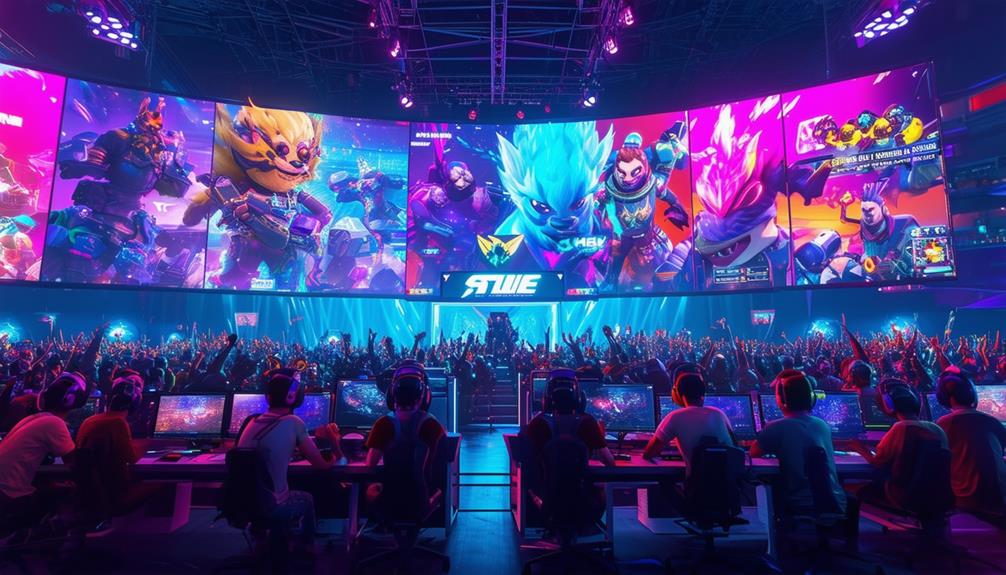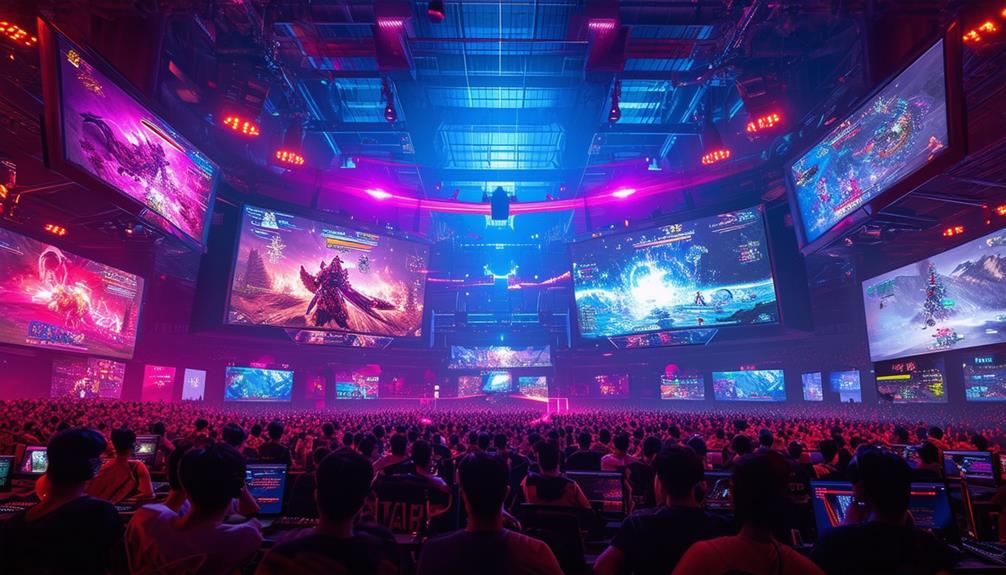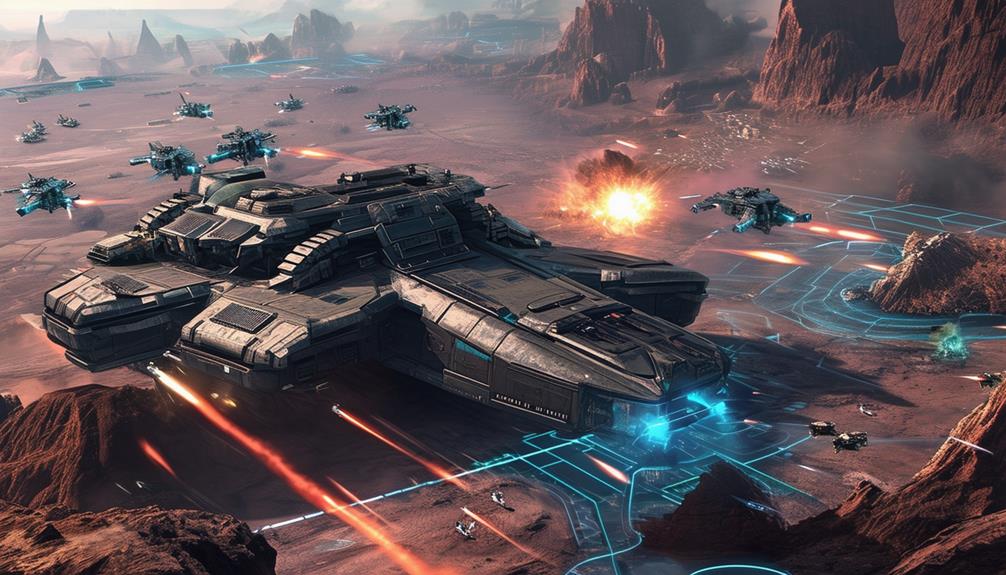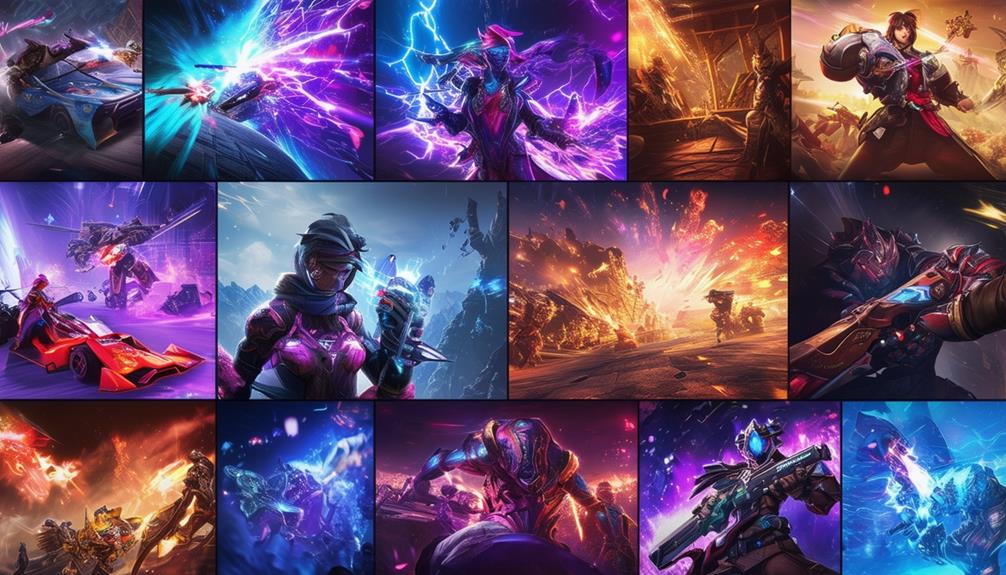Esports Competitions in Virtual Reality Games
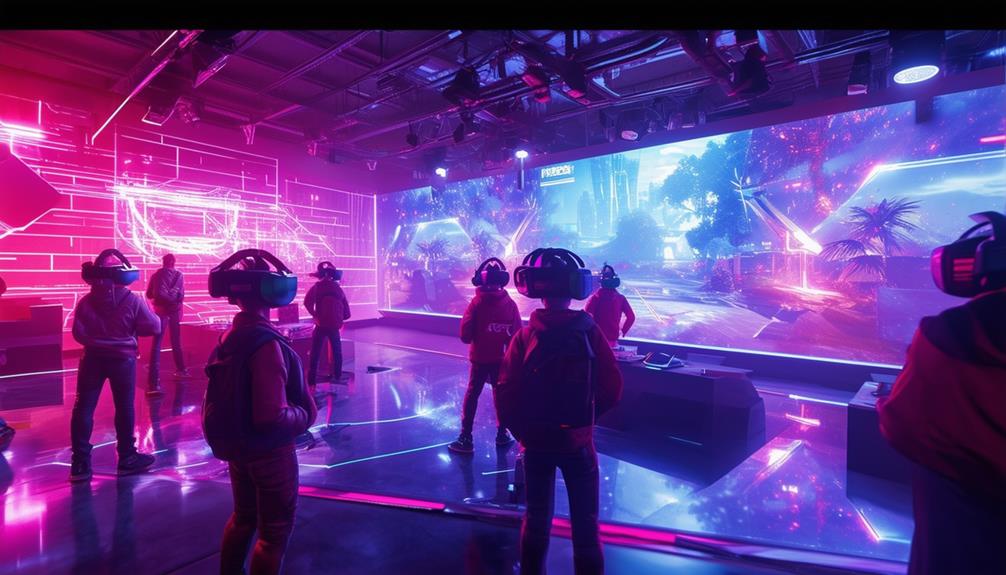
Virtual reality is revolutionizing the esports landscape, with titles like Echo Arena and Onward leading the charge. These games offer an unparalleled level of immersion that traditional screens can't match, transforming not just how games are played, but how they're experienced.
VR esports leagues are attracting global audiences and partnering with developers to continually improve the ecosystem. Curious about how this trend is shaping the future of competitive gaming? There's much more to discover.
Key Takeaways
- VRML Con showcases premier VR esports games, offering substantial prize pools and attracting global participants.
- VR esports titles such as Echo Arena, Onward, and Pavlov are featured in major competitive leagues.
- Events like the Sunset Cup and Blaston Semi-Finals draw enthusiastic VR competitors.
- VR esports tournaments often have sponsors who offer exclusive deals and support the events.
- Advancements in VR technology continuously enhance the immersive experience of esports competitions, making them more engaging and realistic.
Evolution of VR Esports
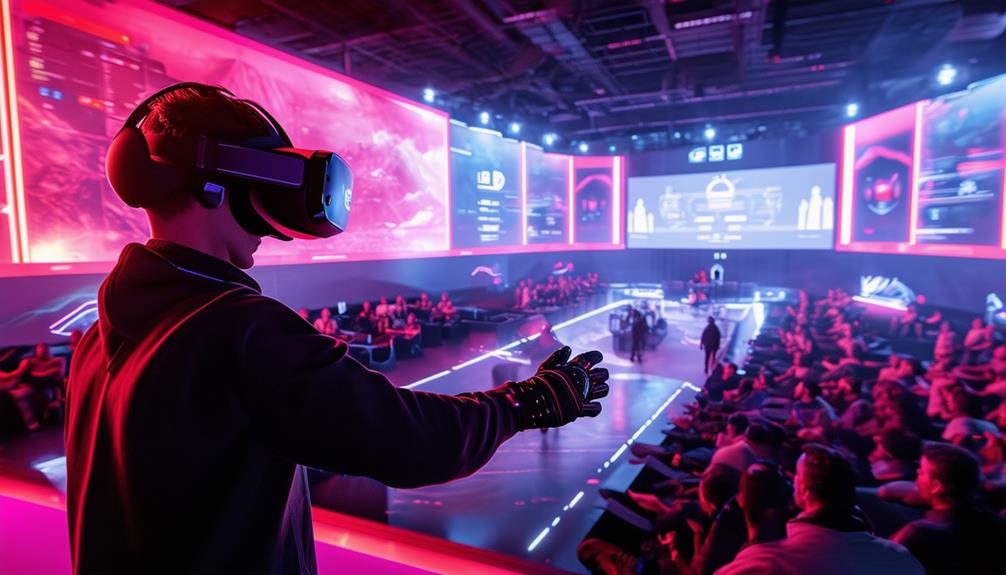
The evolution of VR esports has been swift and significant, featuring exclusive titles like Echo Arena, Onward, and Pavlov that attract a dedicated and growing player base. This progression is evident in the establishment of VR esports leagues such as the Virtual Reality Master League (VRML), the Virtual Reality League (VRL), and VAIL, which organize competitive leagues and tournaments, showcasing the dynamic growth of the VR esports sector.
Participating in a VR esports league immerses you in a vibrant community with substantial prize pools. For instance, events like VRML Con feature tournaments with over $10,000 in prizes, raising the stakes and intensifying the competition. Engagement levels are high, with leagues like the Virtual Arena League (VAL) reporting over 1,000 active players, reflecting the community's enthusiasm and commitment.
These VR esports leagues also collaborate closely with game developers to promote VR titles and enhance the overall esports experience. By hosting events and competitions, they continually push the boundaries of immersive gaming. Joining these leagues means you're not just playing games; you're contributing to a pioneering movement in esports, shaping its future while enjoying every exhilarating moment.
Popular VR Esports Titles
In the realm of VR esports, titles like Echo Arena, Onward, Pavlov, Contractors, and VAIL are at the forefront. These games offer immersive and competitive experiences that captivate both players and spectators. Echo Arena blends fast-paced, zero-gravity sports action with strategic team play, making it a fan favorite. Onward immerses players in tactical military simulations, requiring precise coordination and strategy.
Pavlov and Contractors are premier first-person shooters, each offering unique mechanics and environments that test players' reflexes and tactical acumen. VAIL, a rising star in the VR esports scene, is quickly gaining popularity due to its impressive graphics and advanced gunplay mechanics.
These titles are regularly featured in prominent VR esports leagues, such as the VR Master League, VR Esports League, and the Virtual Athletics League. They attract a global audience and provide a platform for professional players to showcase their skills.
As VR technology evolves, these games continue to grow in popularity, drawing increased participation from players, developers, and sponsors, solidifying their place in the esports world.
Major VR Esports Tournaments
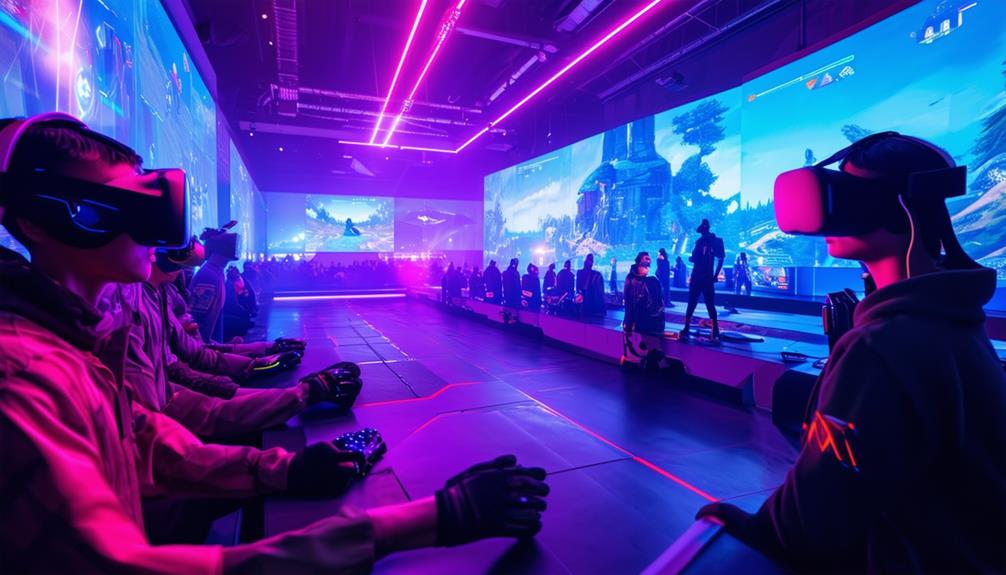
Major esports tournaments in virtual reality attract global attention and showcase the best talent in the industry. One of the standout events is VRML Con 2024 in Denver, CO, featuring exclusive games from top developers like Resolution Games and Ready At Dawn. VRML Con is the premier venue to witness exceptional VR gameplay.
A highlight of VRML Con is the Sunset Cup tournament for Echo Arena, open to anyone with a VRML Con ticket. It's a fantastic opportunity to compete against other VR enthusiasts. Additionally, the Blaston Semi-Finals and Grand Finals will be hosted live at VRML Con, featuring top VR players battling it out in real-time.
Another significant event is the VRML Fall Fest 2022, which showcased championships in Pavlov, Onward, and Echo Arena. These esports tournaments included prize pools and giveaways, adding to the excitement.
Sponsors like VR Arcade USA, Resolution Games, and Ready At Dawn not only support these events but also offer exclusive deals and discounts to attendees. If you're into VR esports, these tournaments are must-attend events.
Technology Behind VR Esports
While it's the thrilling tournaments that often capture the spotlight, the advanced technology behind VR esports is what truly brings these competitions to life. When you immerse yourself in VR Esports, you enter a world created by cutting-edge virtual reality technology. Players don VR headsets, which transport them into immersive virtual environments where they can interact with the game in ways traditional gaming can't match.
VR technology enables realistic movements and interactions, making every action feel incredibly authentic. Whether you're swinging a sword or casting a spell, the sense of presence and engagement is unparalleled. This realism isn't just for show; it significantly enhances the competitive experience, allowing you to fully engage with the game.
As VR Esports technology continues to advance, the possibilities for competitive gaming are expanding. Constant innovations are being integrated, ensuring each tournament is more engaging and immersive than the last. This ongoing progress is opening up new opportunities for both gamers and audiences, making VR Esports one of the most exciting frontiers in competitive gaming. When you witness these intense competitions, remember that it's the sophisticated technology behind them that makes it all possible.
Skills Required for VR Esports
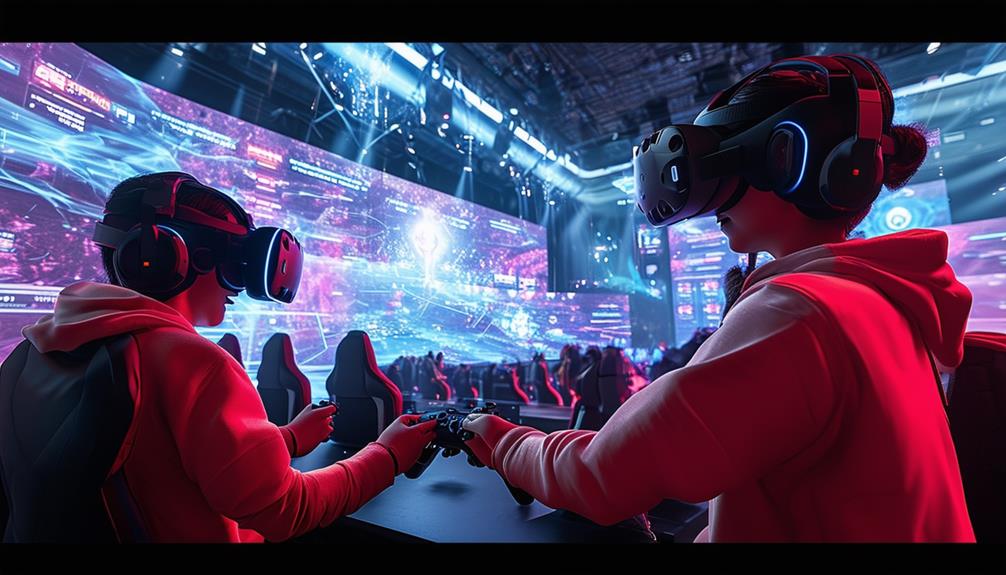
To excel in VR esports, you need a unique blend of physical agility, spatial awareness, and quick reflexes. These skills are crucial for maneuvering dynamic virtual environments and outmaneuvering opponents. Excellent hand-eye coordination is essential for handling immersive gameplay effectively. Quick reflexes enable instant responses to in-game actions, while spatial awareness helps you understand and react to the virtual world's layout.
Strong teamwork skills are indispensable. In a VR esports setting, effective communication and strategic thinking are critical for coordinating with teammates. This ensures smooth execution of game plans and adaptability during intense matches. The ability to stay focused and make split-second decisions under pressure is also essential.
Mastering game-specific mechanics is another key aspect. Each VR game has unique controls and strategies, requiring continuous improvement and practice. Understanding team dynamics and how your role fits within the larger strategy can significantly impact your performance.
Community and Culture
Becoming part of a VR esports community offers players a rich culture of support and camaraderie. In leagues like VRML and VAL, players of all levels find a welcoming environment to connect, compete, and build lasting friendships. This community-driven nature fosters a sense of belonging that transcends the game.
Participation in VR esports events encourages teamwork, communication, and sportsmanship. You're not just playing a game; you're joining a culture that values inclusivity and diversity. The shared passion for immersive gaming experiences creates a vibrant and supportive ecosystem.
In the VR esports community, you'll find:
- Inclusive Environment: Open to all, regardless of skill level or background.
- Teamwork and Communication: Games require coordinated strategies, fostering strong team bonds.
- Supportive Culture: Experienced players mentor newcomers, promoting growth and confidence.
- Lasting Friendships: Shared experiences lead to genuine connections beyond the digital space.
Joining a VR esports community isn't just about the thrill of competition. It's about becoming part of a culture that celebrates every player's journey, making VR esports a unique and enriching experience.
Challenges in VR Esports
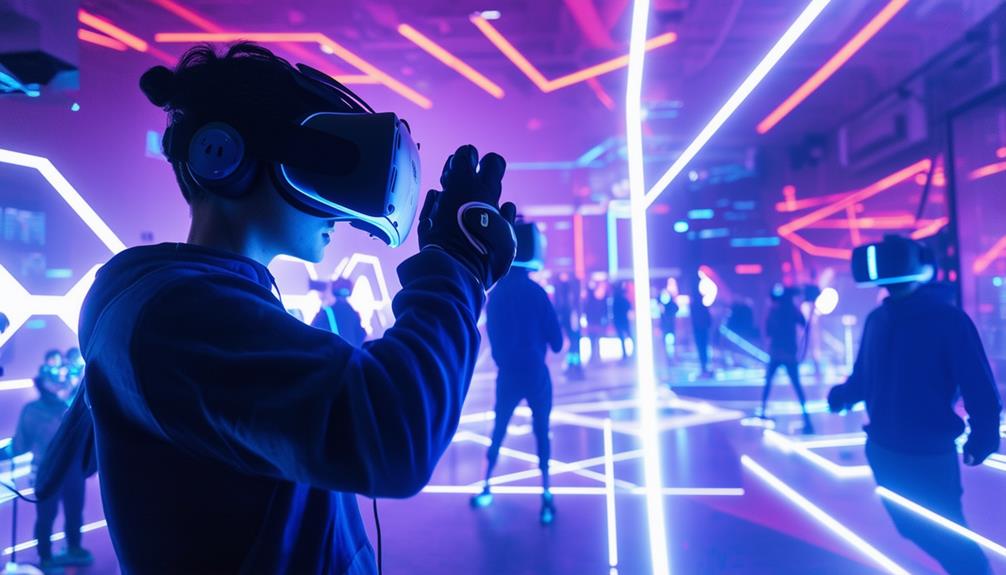
When considering the challenges in VR Esports, players often face significant issues like managing physical strain and coping with motion sickness. Additionally, equipment accessibility remains a major barrier, as the high costs and compatibility issues deter many potential participants. These obstacles significantly impact the growth and inclusivity of VR Esports.
Physical Strain Management
Balancing intense gameplay with proper ergonomics is essential for managing physical strain in VR esports. Prolonged sessions can lead to discomfort, eye strain, and even motion sickness. However, there are effective strategies to mitigate these issues and optimize your performance.
First, prioritize ergonomics. Ensure your gaming setup supports good posture and consider using ergonomic accessories. Taking regular breaks is crucial; stepping away from the screen reduces eye strain and allows your body to recover. Staying hydrated is also essential for maintaining well-being during intense sessions.
Here are some tips to manage physical strain in VR esports:
- Ergonomics: Ensure your setup promotes good posture and comfort.
- Regular Breaks: Take short breaks every 30 to 60 minutes to rest your eyes and stretch.
- Hydration: Drink water consistently to stay hydrated and maintain energy levels.
- Specialized Training: Engage in exercises designed to strengthen muscles used during VR gameplay.
Equipment Accessibility Issues
The rising popularity of VR esports faces significant hurdles due to the high cost and limited availability of essential equipment. High-end VR headsets and compatible PCs are substantial investments, which many enthusiasts find prohibitive. This financial barrier can be particularly discouraging for those eager to join the VR esports arena.
Moreover, the availability of VR equipment varies widely by region. In some areas, acquiring a VR headset, controllers, and sensors can feel like a scavenger hunt, making it difficult to obtain the necessary gear. Even when equipment is available, high demand and production constraints often lead to shortages, further complicating access.
The need for various peripherals, such as controllers and sensors, adds another layer of difficulty. These components are crucial for an immersive experience, and without them, performance in VR competitions can be severely hampered.
Addressing these equipment accessibility issues is essential for fostering inclusivity in VR esports. Making equipment more affordable and accessible would enable a broader range of players to participate, thereby expanding the reach and impact of virtual reality competitions.
Motion Sickness Concerns
Motion sickness is a significant challenge in VR esports, impacting both player performance and overall experience. Factors like frame rate, field of view, and game design can contribute to VR motion sickness. A low frame rate can make the virtual environment feel choppy, while a narrow field of view can cause disorientation. Poor game design that doesn't consider smooth movements can also exacerbate the issue.
To combat VR motion sickness, game developers often implement comfort settings. These can include options to adjust the field of view, reduce motion blur, and stabilize the camera. Players can gradually build tolerance to VR motion sickness through regular, controlled exposure to VR environments.
Consider these tips to minimize VR motion sickness during esports competitions:
- Proper VR equipment setup: Ensure your VR headset is correctly adjusted for comfort and clarity.
- Take breaks: Regular breaks can help your body adjust and reduce the likelihood of motion sickness.
- Gradual exposure: Slowly increase the time you spend in VR to build up your tolerance.
- Utilize comfort settings: Use in-game options designed to reduce motion sickness.
Future of VR Esports
As VR technology advances, the future of VR esports looks incredibly promising with more immersive gameplay and innovative tournament formats. VR esports are poised for rapid growth, driven by dedicated leagues and tournaments for games like Echo Arena, Onward, and Pavlov, which already boast solid player bases and the potential for even more engaging experiences as technology evolves.
Organizations such as VR Master League (VRML), VAIL, and others are at the forefront, providing robust platforms for competition and skill showcasing. These organizations continually innovate, offering exclusive game content and unique tournament structures that keep the competitive scene dynamic and exciting. This creates new opportunities for players, developers, and sponsors, fostering a thriving VR esports ecosystem.
The rise of VR technology combines the best of virtual reality and traditional esports elements, creating a unique and engaging competitive environment. Imagine participating in a tournament where you're not just pressing buttons but physically ducking, aiming, and strategizing in a fully immersive world. The future of VR esports promises a thrilling blend of physicality and strategy, marking an exciting new frontier for competitive gaming.
How to Get Started
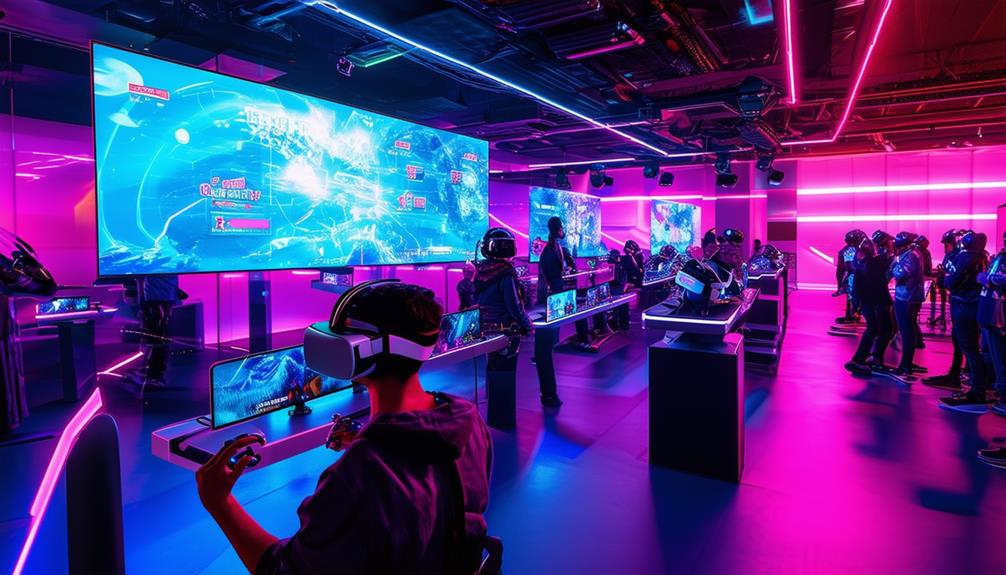
To get started in VR esports, first choose the right equipment that suits both your budget and gaming preferences. Next, find and participate in competitions by joining VR esports leagues and following their social media channels. Engage with the community on platforms like Discord for the latest updates and support.
Choosing VR Equipment
Getting started with VR esports begins with selecting the right equipment tailored to your specific needs and the demands of your chosen game. To excel in VR gaming competitions, you need a VR headset that offers high-resolution displays and precise motion tracking. Ensuring your equipment is compatible with the game's platform and any additional peripherals is essential for optimal performance.
When choosing your VR headset, consider these key factors:
- Type of VR Headset: Different games may require specific headsets. Choose one that aligns with your preferred VR gaming experience.
- Display Quality: High-resolution displays provide clearer and more immersive visuals, giving you a competitive edge.
- Motion Tracking: Accurate motion tracking is crucial for precise in-game movements.
- Comfort and Durability: Long gaming sessions require gear that's comfortable, durable, and adjustable.
Seek feedback and recommendations from experienced VR esports competitors for valuable insights into the best equipment for competitive play.
Finding Competitions Online
Finding online VR esports competitions has become increasingly accessible, thanks to a plethora of resources available. Begin by exploring VR esports organizations such as VR Master League (VRML), VR Esports League, and Virtual Athletics League. These platforms provide comprehensive information on upcoming virtual reality competitions.
Joining their Discord communities and regularly checking their official websites will keep you updated on the latest tournaments and events. For example, VRML hosts events like the Fall Fest, featuring championships in popular games like Pavlov, Onward, and Echo Arena. These events not only offer competitive excitement but also opportunities to win exclusive offers and discounts from sponsors like HyperX, ProtubeVR, and Helga the Manager.
Additionally, consider exploring unique VR tournaments hosted by platforms like Virtual Athletics League, which often features games such as Nock. Participating in these competitions can enhance your skills and enrich your gaming experience.
Frequently Asked Questions
Is There Esports for Vr?
Yes, there are esports for VR. Leagues like VRML (Virtual Reality Master League) and VAIL host tournaments for games such as Echo Arena and Onward, offering a unique and immersive experience that's rapidly growing in popularity.
Does Vrml Still Exist?
Yes, VRML (Virtual Reality Master League) still exists and is actively hosting competitive VR esports tournaments. They recently organized VRML Con 2024 in Denver, featuring exclusive games and substantial prizes, underscoring their continued presence in the VR esports scene.
How to Participate in Esports Tournaments?
To participate in esports tournaments, register on reputable platforms like VRML or Virtual Athletics League. Form or join a team, adhere to the schedule, and stay updated on rules and prizes through official websites and social media channels.
Can You Play League of Legends on Vr?
League of Legends cannot be played in VR because it is designed as a traditional PC-based game. VR gaming focuses on immersive experiences with different genres and mechanics. As a result, League of Legends remains a staple in the competitive gaming scene outside of VR.
Conclusion
VR esports competitions offer more than just thrilling gameplay; they represent the future of gaming. Leading titles such as Echo Arena and Pavlov, along with leagues like VRML and VAIL, are pioneering immersive and exciting tournaments. By joining the VR esports revolution, you can become part of a community that's shaping the next frontier in competitive gaming.

